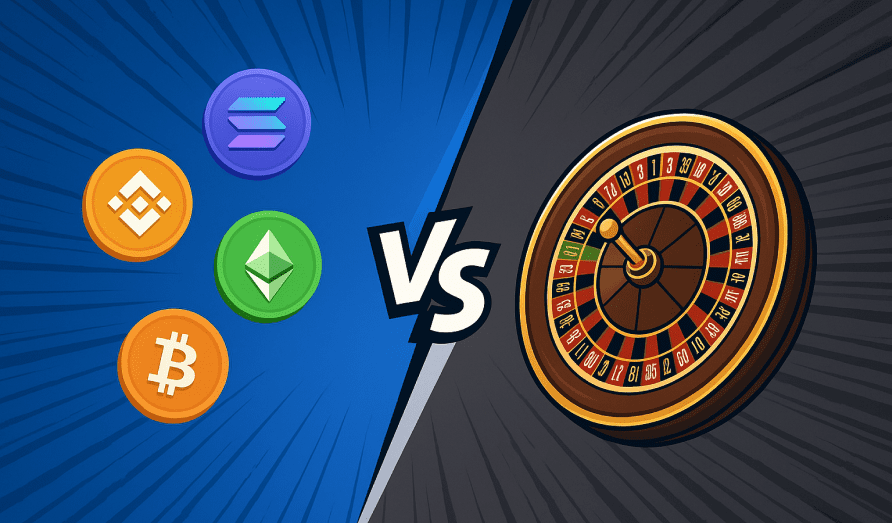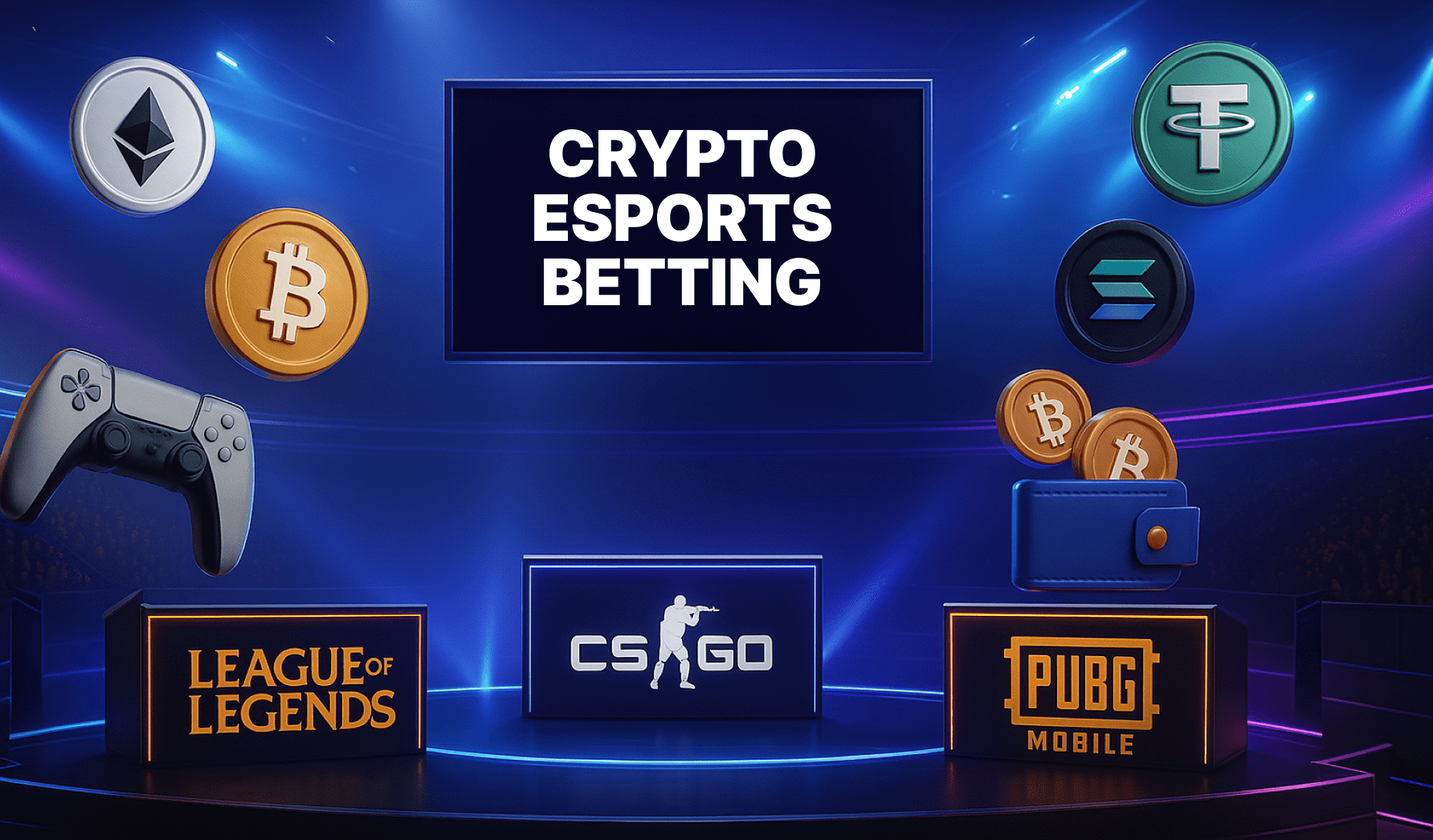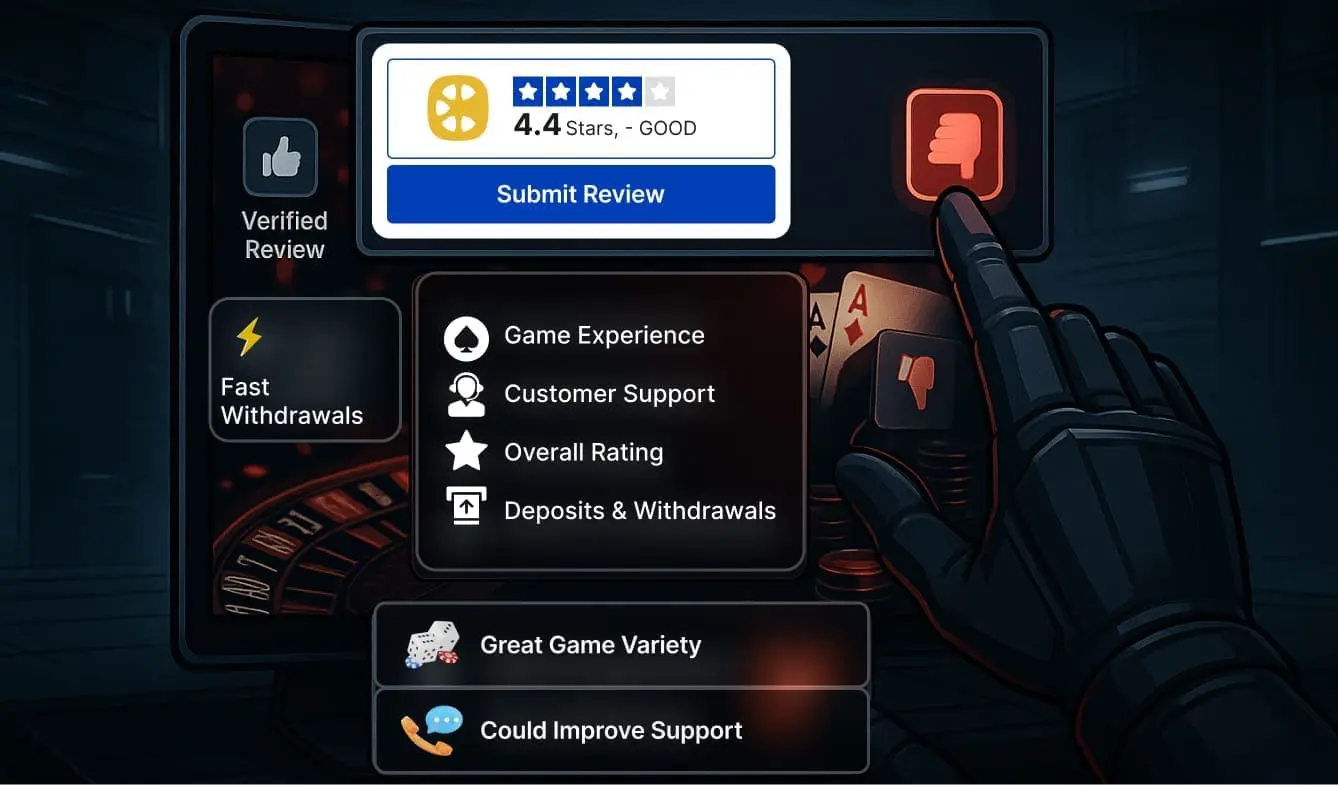
What Exactly Makes Crypto Casinos Better than Fiat Online Casinos?
How does the crypto casino scene compare to traditional online gambling? How did we get here, and what are the differences that players need to know about?
These are the questions we’ll be answering in this original CoinBets guide. We’ll delve into the mechanics of both, consider the advantages and disadvantages of each, and speculate about what the future holds. Armed with this information, you’ll be able to pick the best online gambling option for your individual needs.
So, grab a coffee, get comfy, and let’s explore crypto versus fiat online gambling.
Online Gambling is Everywhere
With the rise of the internet, and especially the proliferation of broadband internet access from the early 2000s onwards, the popularity of gambling has exploded globally.
Indeed, the evolution of online gambling has radically transformed how people play games of chance and skill. What was once only available in bricks-and-mortar casinos and arcades, is now accessible from virtually anywhere. More recently, another revolution has begun to transform the online gambling space — the dawning of the cryptocurrency and Web3 era.
The adoption of blockchain technology has resulted in the rapid growth of crypto casinos, which offer a compelling alternative to traditional online gambling platforms. Cryptos like Bitcoin, Ethereum, Litecoin and dozens of other altcoins are now popular payment methods, appreciated by gamblers for providing greater privacy, faster transactions, and truly global accessibility.
How We Got Here: Traditional Online Gambling
But, to understand where we’re going, we need to know where we’ve been. So, to start with, let’s consider traditional online gambling platforms.
The first true online casino, “The Gaming Club,” was launched way back in 1994 by Microgaming — an Isle of Man-based company that has since grown into an industry giant. Yep, online gambling platforms have been evolving for over three decades — quite some time!
Today, there are hundreds of online casino brands — some with millions of registered players.
These traditional online casinos and sportsbooks rely on an extensive infrastructure that includes platform, game, and payment providers. They use fiat payment methods such as credit and debit cards, digital wallets like PayPal and Skrill, and bank transfers for deposits and withdrawals.
This system requires players to create an account, verify their identities with official documents, and use one of the conventional payment methods. Usually this is a closed-loop system — i.e. using the same method for depositing and withdrawing.
While slots and sports betting are the two most popular offerings at traditional online gambling sites, table games, poker, and live dealer games, bingo, instant wins, lottery, and virtual sports are also commonly offered.
A Space Dominated by Huge Corporate Operators
Although there are hundreds of small online casino and sportsbook brands, the space is dominated by huge corporate operators. These include giants like Entain Group, Flutter Entertainment, Evoke, and Betsson Group — each with many well-known gambling brands in their portfolios.
These large brands have earned reputations for offering fair, regulated, high-quality gambling experiences. Indeed, many of these, like William Hill ( Evoke), Paddy Power (Flutter Entertainment), and Ladbrokes (Entain Group) had already established their reputations long before online gambling existed — for example, William Hill was founded as far back as 1934.
🕹️ Evolution of Online Gambling
From Casinos to Crypto – A 30-Year Shift
1994
Microgaming launches the first-ever online casino — and the digital gambling era begins.
1996
Kahnawake Gaming Commission starts issuing licenses, setting the rules for online casinos.
2004
Casinos bring real dealers to screens, blending live action with internet access.
2009
Satoshi Nakamoto drops Bitcoin. Crypto becomes the future currency of online gambling.
2011
U.S. government shuts down top poker sites. A wake-up call for online regulation.
2012
SatoshiDice launches. Fully anonymous. Fully provably fair. The crypto era kicks off.
2014
Some countries begin drafting laws for crypto casinos. It’s no longer just a grey area.
2017
Bitcoin booms. New crypto casinos flood the scene as adoption surges.
2020
Smart contracts and NFTs start powering betting, rewards, and asset ownership.
2023
Traditional platforms embrace crypto. Fiat + BTC in one place = mass adoption begins.
Benefits of Traditional Online Gambling
The traditional online gambling space tends to be tightly regulated, with more and more countries and states establishing regulatory bodies.
Strong Player Protection
Authorities such as the UK Gambling Commission (UKGC), Malta Gaming Authority (MGA), and Swedish Gambling Authority (SGA) have created complex legal frameworks in the name of protecting players. Specifically, regulators tend to focus on fair play, responsible gambling, and combating money laundering.
Indeed, it is trust, both in individual well-established brands and in regulatory bodies, that has long been the biggest selling point for many traditional gambling sites. Familiar brands that operate within established regulatory frameworks offer high degrees of consumer protection.
This has enabled them to attract and retain customers even in the face of stiff competition from unlicensed offshore operators. Even when those operators offer much bigger bonuses and significantly more games and features.
Trust, Familiarity and Service
Traditional online gambling platforms do still offer a wide variety of games, including many familiar and well-established types. And, at these licensed casinos, players know that all the games have been independently tested and certified for fairness and quality.
Additionally, these gambling platforms have responsive customer support services, usually available via live chat, email, and sometimes phone. At licensed sites in larger jurisdictions, like the UK, this support is often provided by teams based domestically rather than abroad.
Drawbacks of Traditional Online Gambling
Despite the benefits, players using traditional online gambling platforms also face a number of challenges.
Payment Issues
Perhaps the most significant of these is slow transactions — especially withdrawals. This is usually due to the speed of traditional banking processes and delays caused by regulatory requirements like KYC (know your customer) checks. Illustrating this point, it’s not unusual for a withdrawal via bank transfer to take more than a week at a traditional online casino.
Furthermore, in some jurisdictions, licensed casino and sportsbook operators are prohibited from accepting certain payment methods. For example, in 2020 the UKGC banned licensees from accepting credit card payments — with Australian authorities following suit in 2024.
Adding to the complexity, even if a site does support a certain payment method, individual banks and card issuers often block gambling transactions. For example, some UKGC-licensed sites now state that Mastercard debit cards can only be used for depositing due to new card issuer rules.
And, even when payment methods are accepted, high transaction fees can sting both players and site operators. Some traditional operators also add fees for using particular e-wallets, or even for just processing any withdrawal request.
Geographical and Product Restrictions
Another major drawback for players using traditional online gambling sites is geographical restrictions. This is the result of a confusing patchwork of different national and local regulations.
Some countries prohibit online gambling entirely, others only allow sites licensed by their own regulatory body, and some jurisdictions only allow specifically certified or approved games to be offered.
The New Frontier: Crypto Gambling
Superficially, crypto gambling and traditional online gambling have a lot in common. Indeed, on the surface, many crypto casinos and fiat casinos look similar. However, there are important differences, mostly relating to how funds are deposited, wagered, and withdrawn.
Instead of using fiat currencies like the US dollar, euro, or British pound, crypto casinos and sportsbooks accept cryptocurrencies like Bitcoin, Ethereum, Bitcoin Cash, Litecoin, Tether, BNB, XRP, and other altcoins.
The different cryptos have their own individual qualities, but all are based on blockchain technology. This is a decentralized ledger system that ensures transparency, security, and the immutability of transactions. Crypto casinos and sportsbooks range from largely traditional centralized platforms that just support crypto payments, to fully decentralized peer-to-peer platforms.
Most of today’s large crypto gambling platforms, like Stake, Roobet, Gamdom, and BC Game fall somewhere in between. These hybrid platforms are run by centralized businesses, but incorporate features like:
- Crypto payment support
- Provably fair games
- Native tokens and tokenized reward programs
Decentralized peer-to-peer gambling platforms include social betting platforms like KUTT, and Web3 sportsbook Dexsport. Some large crypto casinos, like Luck also claim to be full decentralized.
Limitless Possibilities, Endless Innovation
While fully decentralized gambling is still in its early days, one thing is very clear: Smart contracts — self-executing contracts based on blockchains like Ethereum, Solana, and Cardano — have the potential to revolutionize the space.
Already, some decentralized platforms are using this technology to allow true decentralized betting. Smart contracts manage and verify individual bets, and automatically execute payouts — without any need for human intervention.
But even hybrid crypto casinos are harnessing the power of blockchain tech through provably fair gaming. This system uses cryptographic algorithms to allow players to verify the fairness of each game outcome, removing the need to trust either the casino operator or game developer.
Breaking Free from Legacy
Gambling

- Centralized Control
- Slow Transactions
- Fiat Limitations
- Regulatory Delays
- Banking Restrictions

- Provably Fair Games
- Immutable, Decentralized Transactions
- Decentralized platforms like KUTT and Dexport
- Instant Crypto Withdrawals
Benefits of Crypto Gambling
Needless to say, crypto casinos can offer features and products that traditional online platforms can’t. For example, provably fair games, crypto trading, NFT lootboxes, tokenized rewards, and DeFi features like staking.
But they also offer several more fundamental benefits too. These are things that don’t just add extra features, but rather improve the core gambling experience.
Enhanced Privacy and Security
One of the most appealing benefits of crypto gambling is enhanced privacy for users.
Of course, the level of privacy depends on several things, including the specific gambling platform and cryptocurrency you’re using. And remember, crypto transactions are pseudo-anonymous, not completely anonymous.
But on the whole, crypto transactions don’t require the same level of personal information as traditional payment methods. This means you’re reducing the risk of identity theft and fraud.
Faster, Cheaper Transactions
Cryptocurrency transactions can also be much faster than those involving fiat currencies.
Again, it depends on the specific crypto in question, but transactions using lightweight altcoins like Litecoin, Bitcoin Cash, or Tether, are usually processed virtually instantly. Even Ethereum and Bitcoin, which tend to be the slowest cryptos, are much faster than a bank transfer.
Plus, transaction fees are normally extremely low or even non-existent for both the player and casino operator.
This is especially significant for gambling operators, who often absorb significant transaction fees on behalf of their customers. And, if gambling operators can lower their operational costs, they can afford to offer better bonuses to players.
Improved Accessibility and Censorship Resistance
A further advantage of crypto gambling is its sheer accessibility. Theoretically at least, cryptocurrencies allow casino operators to do business with players anywhere in the world.
Anyone who has internet access and a crypto wallet can deposit and withdraw. This is an example of censorship resistance — one of the most attractive aspects of cryptocurrency and decentralization in general.
Drawbacks of Crypto Gambling
But (there’s always a “but”), the very fact that crypto gambling sites can operate outside of the reach of regulators can be a double-edged sword.
Weak Player Protection
Because crypto casinos often operate from obscure, “light touch” jurisdictions, players can find themselves with little or no protection in the event of a dispute or fraud.
For example, most crypto casinos are now licensed in Curacao, Anjouan, or Tobique. And while the former is attempting to introduce improved standards, the latter two are very much “jurisdictions of convenience” for operators — offering virtually no protection for players.
Good luck trying to complain to the authorities in Mutsamudu if you want to recover lost funds. “Where the heck is Mutsamudu?” you ask. Exactly.
Crypto Price Volatility
The price volatility of cryptocurrencies is also an inherent risk when engaging in crypto gambling of any sort.
The value of digital currencies is prone to dramatic and extremely rapid fluctuations, meaning your funds can lose significant value between the time of deposit and withdrawal. Of course, they can also go up in value during the same time — but, it can make managing a gambling bankroll tricky.
Want some tips? Check out the these practical strategies to mitigate risks from crypto market volatility.
Dodgy Operators
Finally, because of its ability to offer pseudo-anonymous transactions, the crypto space still attracts some scammers. And, there’s no getting around it, the gambling industry has seen its fair share of rogue operators willing to take advantage of unsuspecting players over recent years.
As we’ve said many times, if something sounds too good to be true, it usually is. In fact, we’ve written a whole guide to avoiding crypto gambling scams — check it out, it could save you a lot of stress.
| Payment Methods | Traditional Gambling Sites | Crypto Gambling Sites |
|---|---|---|
| Security |
|
|
| Security | Strong regulatory frameworks and oversight | Decentralized, with provably fair systems |
| Accessibility | Limited by regional laws and regulations | Global accessibility, few regional restrictions |
| Transaction Speed | Slow, especially for withdrawals | Fast, virtually instant deposits and withdrawals |
| Transaction Fees | Can be high, depending on payment method | Typically very low |
| Privacy | Requires personal and financial details and ID verification | Offers high levels of anonymity |
| Games | Wide selection of games and betting options | Wide selection at centralized crypto casinos. Limited choice of truly decentralized games |
How to Choose Between Traditional and Crypto Gambling
Here at CoinBets.com, we love crypto casinos and sportsbooks, but whether it’s the best choice for you will depend on your personal priorities.
If familiarity and customer protection are your main concerns, then it might be better to opt for one of the traditional gambling platforms. The environment will be more familiar to those used to offline betting, and you’ll have the reassurance of a clear dispute resolution process should anything go wrong.
Likewise, if you don’t feel comfortable using cryptocurrency wallets and exchanges, then you’re better off sticking with fiat-based platforms (at least until you catch the crypto bug).
On the other hand, a good crypto casino or sportsbook site will suit those who prioritize privacy, speed, and exciting new games and Web3 features.
And don’t forget, if you’re living in a country with repressive gambling regulations, a crypto platform may be the only safe way to access online gambling.
Traditional vs. Crypto Gambling
A Side-by-Side Showdown
-
🛡️ Fully Regulated & Licensed
UKGC, MGA, and other watchdogs keep it tight.
-
💳 Fiat-Only Payment Systems
Think cards, banks, PayPal — all tied to your identity.
-
🐢 Slow & Clunky Transactions
Withdrawals can take days. Fees and delays are standard.
-
📞 Legacy Support Channels
Phone lines, live chat, and email — if you’re lucky.
-
🎰 Wide Game Variety
Slots, blackjack, live dealers — both sides bring the heat.
-
🎁 Bonuses & Promos
Crypto or fiat, everyone wants your deposit.
-
💻 Play Anywhere
Desktop or mobile — both formats support modern gamblers.
-
🌍 Geo-Based Restrictions
Where you live still matters (for now).
-
🧩 Light Regulation
Most platforms skip the red tape.
-
🪙 Crypto Payments Only
Bitcoin, ETH, USDT, SOL, and more — no banks, no middlemen.
-
⚡ Instant Transactions
Withdraw in seconds, not business days.
-
🕶️ Privacy Built In
No ID, no docs — just wallet, wager, win.
Future Online Gambling Trends
So, we’ve looked at the history or online gambling and how cryptocurrencies and decentralized technologies are revolutionizing the industry right now. But what does the future hold? Will things stay on their current trajectory, or will we see major changes?
Tier 1 Regulators Enable Crypto Support
As already mentioned, most of today’s “crypto casinos” are actually hybrid crypto-fiat platforms. They are operated by centralized companies, but support crypto payments alongside fiat options, and have integrated blockchain-based elements like provably fair games.
So far, this hybrid approach has only really been possible for operators licensed in more lenient offshore jurisdictions like Curacao and Anjouan. But, as crypto becomes more mainstream, we expect even the strictest regulators, like those in the UK, the Netherlands, and Sweden, will eventually ease up and facilitate crypto payments.
This will likely result in many of the biggest online gambling brands adding limited crypto payment options. However, they will still be required to comply with strict KYC (Know Your Customer) and AML (Anti-Money Laundering) rules.
Provably Fair Games Become the New Standard
Provably fair games, on the other hand, will probably become common even at licensed casinos that can’t accept crypto payments. There’s no real reason why the technology can’t be integrated into licensed casinos, assuming the game providers get the titles appropriately certified.
The stumbling block is that most people currently using traditional online casinos aren’t familiar with the crypto space or decentralization, so there’s little demand. But, as the general population becomes more familiar with blockchain and smart contracts, this will change.
Importantly, as the market for provably fair games grows, major game providers (Pragmatic Play, Hacksaw, Nolimit City, etc.), will be more willing to invest in product development. This will give provably fair games more mainstream appeal, and help create even more demand.
The Inevitable Regulatory Pushback
Here’s the “but” again; many regulators are still struggling to get their heads around the core concepts of cryptocurrency and decentralization, let alone crypto gambling.
While some jurisdictions have accepted that crypto is here to stay and are trying to provide clear legal frameworks, others are still a mess. So, in some countries, we will see progressive policies that make crypto adoption easier. But we are just as likely to see regressive policies in other places.
A prime example is in the United States, where crypto has turned into something of a political football. Yep, Trump loves it, but those Democrats weren’t so keen — and a term is only 4 years!
When AI Meets Crypto Gambling
Additionally, the relentless progress in the fields of artificial intelligence (AI), virtual reality (VR), and augmented reality (AR) will certainly play a role in shaping the future of crypto gambling platforms.
In very broad terms, they offer the promise of more immersive, and interactive gambling experiences. AI, especially, will allow operators to offer highly personalized bonuses and products, while at the same time reducing operational costs. There’s also potential for improved safer gambling tools and more effective fraud prevention and security.
And, given the forward-looking nature of the crypto gambling industry and player base, we think it’s safe to say both will be pushing the AI envelope.
What’s Next for Crypto Gambling?
5 Trends Shaping the Future
Hybrid Crypto-Fiat Casinos
Provably Fair Becomes Standard
AI-Powered Personalization
VR & AR Gambling Worlds
Regulatory Tug-of-War
Crypto Casinos vs Traditional Online Casinos: Final Thoughts
Both traditional and cryptocurrency gambling offer distinct advantages and disadvantages.
Traditional casino and sportsbook sites offer the security of well-established regulatory frameworks, a wide variety of familiar games, and proven customer support. On the other hand, crypto gambling sites offer faster transactions, provably fair games, more privacy, and virtually unrestricted global access.
Also, let’s not forget, that many people, especially the older generations, just aren’t interested in learning about or using crypto in the first place – and that’s fair enough.
But, the world is changing.
Bitcoin has been around since 2009, and a generation has now grown up in the crypto age. Indeed, by 2024, it was estimated that 40% of American adults owned crypto — that’s potentially 93 million crypto users in the United States alone. And, it’s a trend that’s being mirrored around the world.
At the same time, the concept of local regulations in a borderless online reality is becoming increasingly absurd. The friction created by things like KYC rules, and transaction blocks from banks, will keep pushing more people towards crypto gambling.
Like most things in life, there isn’t a one-size-fits-all solution, and both traditional and crypto online gambling are going to coexist for the foreseeable future. The most important thing is to make informed decisions based on your individual preferences and risk tolerance.
We hope you’ve found this original CoinBets article interesting, and if you’ve got any thoughts about the subject, we’d love to hear about them below.
Join The Conversation
No comments yet. Be the first to comment!
 Continue with Apple
Continue with Apple Continue with Google
Continue with Google


Comments (0)
Share